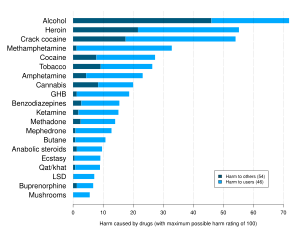
Alcohol detoxification (also known as detox) is the abrupt cessation of alcohol intake in individuals that have alcohol use disorder. This process is often coupled with substitution of drugs that have effects similar to the effects of alcohol in order to lessen the symptoms of alcohol withdrawal. When withdrawal does occur, it results in symptoms of varying severity.
As such, the term "detoxification" may be somewhat of a misnomer since the process need not refer exclusively to the removal of toxic substances from the body. Detoxification may or may not be indicated depending upon an individual's age, medical status, and history of alcohol intake. For example, a young man who binge drinks and seeks treatment one week after his last use of alcohol may not require detoxification before beginning treatment for alcohol use disorder.
Some addiction medicine practitioners use the term "withdrawal management" instead of "detoxification".[2][3]
- ^ Nutt DJ, King LA, Phillips LD (November 2010). "Drug harms in the UK: a multicriteria decision analysis". Lancet. 376 (9752): 1558–1565. CiteSeerX 10.1.1.690.1283. doi:10.1016/S0140-6736(10)61462-6. PMID 21036393. S2CID 5667719.
- ^ "Adult Substance Use Withdrawal Management Services | Texas Health and Human Services".
- ^ "The ASAM Clinical Practice Guideline on Alcohol Withdrawal Management" (PDF). asam.org. 23 January 2020. Retrieved 17 July 2023.
© MMXXIII Rich X Search. We shall prevail. All rights reserved. Rich X Search
